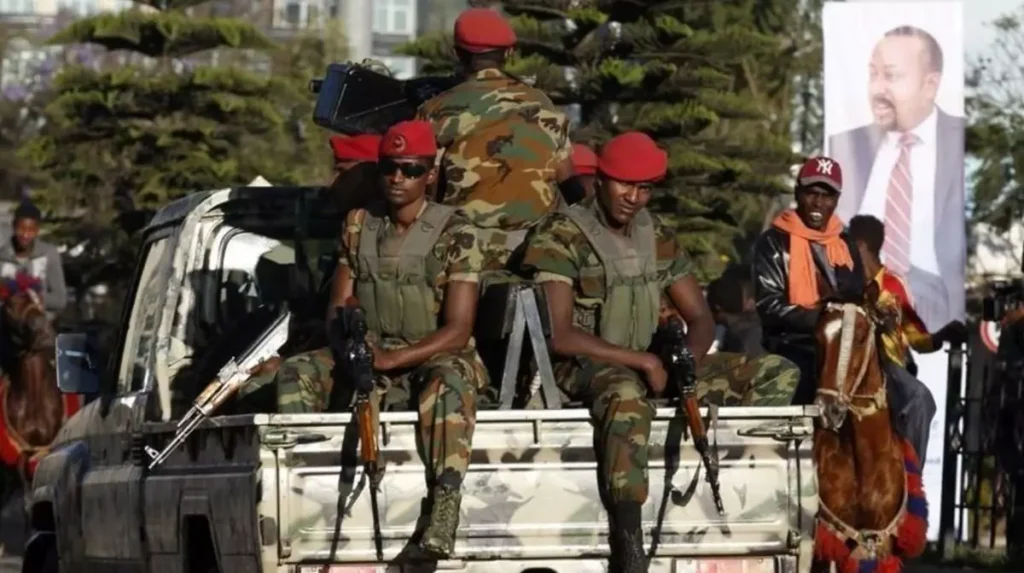End Ethiopia’s War Against Its Own People
Giovanni R. Ruffini
Professor of History
Fairfield University, USA
The Ethiopian government must stop its military’s continuous attacks against its own citizens or face the harshest penalties from the international community. Nobel Peace Prize winner Prime Minister Abiy Ahmed’s war against the Amhara people has been underway for years now, but the details from 2024 alone are horrifying enough. On January 29 and 30, the Ethiopian military conducted an extrajudicial massacre in Merawi, in the Amhara Region, after a prolonged battle for control of the town between the military and the Amhara region’s Fano rebels. Survivors attributed the massacre to the military’s desire to seek vengeance on Fano. Video evidence (see the clip accompanying this article) shows the streets of the town lined with dead bodies, primarily of young men, many of whom were unidentifiable after being shot in the head. The Ethiopian Human Rights Commission puts the death toll at 80.
Since the start of its war against the Amhara, the government has used both street violence and aerial assaults. On February 19, a military drone targeted an Isuzu truck in the Amhara region and wiped out nine members of a single family returning from a baptism ceremony. This was not the first case. Drone strikes hit civilians in Amhara Sayint in South Wollo on December 10, killing dozens. Drone strikes hit civilians in Finote Selame in August, also killing dozens. These drones – Iranian, Chinese, but primarily Turkish – are now the sharp point of the spear in the central government’s war against the Amhara. Drones lead the government’s charge against the Oromo Liberation Army as well.
The Amhara resistance movement, Fano, began as a loose and disorganized grassroots movement, but is rapidly organizing and consolidating. It began as an understandable reaction to years of abuse and neglect at the hands of the central government. The Amhara people have suffered ethnic cleansing in the Oromia region. They have suffered denial of access to the fertilizer so necessary for their agricultural livelihood. Over 30 million Amhara (the second largest group, after the Oromo, in a country of over 116 million) have said “no” to Abiy’s discriminatory regime and policies. In response, government forces have overrun the region, killing thousands of innocent people.
Note that this is the second time Abiy Ahmed has unleashed an all-out war on a major Ethiopian region. Hundreds of thousands of people were killed when Tigrean rebels overran the Amhara and Afar regions a couple of years ago, during the war between the federal government and the Tigray region. More recently, government interference in religious affairs has begun to tear at the fabric of Ethiopia’s ancient heritage. The Orthodox Church is under physical attack by government forces. Abiy Ahmed has even dashed hopes for regional peace between Ethiopia and Eritrea, as he is currently at odds with President Afeworki of Eritrea.
It is time for the international community and international human rights organizations to speak the truth and persuade Abiy Ahmed to stop the genocide in the Amhara region. The alternative would be a situation where millions of people succumb to famine and civil war. Such a scenario would impact the global community, morally, physically, and economically, if millions of Ethiopians are forced to flee their country due to ongoing war and famine. The Amhara region is being strangled, with highways and roads within the region and those linking the region to the rest of the country disrupted by this war.
This should not be allowed to prevail. The long-term solution to Ethiopia’s political problems does not lie in the violent destruction of all opposition. It lies in the creation of a democratic political system that can promote Ethiopian nationhood, nurture the distinct values and cultural traditions of 80-plus linguistic groups, and establish a constitutional order and state structure cutting across ethnic divides.
Perhaps the country should bring back its age-old monarchy to foster the unity of the Ethiopian people. A constitutional monarchy has, indeed, been known to aid in stabilizing democratic societies. It is time to abandon Ethiopia’s divisive and conflict-prone ethnic federalism. Under Abiy Ahmed, corruption within the government and its administrative units has risen to a level that has never been seen in Ethiopia to date. But with these new levels of violence, time is running out, and something should be done immediately. The anonymous, clinical brutality of drone warfare; the government use of shrapnel banned by international conventions on warfare; and the indiscriminate killings of innocent civilians show that the Ethiopian government no longer sees its own citizens as human beings. A government with this vision of the world has lost its inherent legitimacy. Only a new government can bring a fresh start.
U.S. Special Envoy for the Horn of Africa Mike Hammer was recently in Addis Ababa to work on the implementation of the ceasefire between the government and the Tigray People’s Liberation Front. He has offered to help with dialogue between the government on the one hand and the rebels in Amhara and Oromia on the other. But it is not clear that the U.S. is in a position to help. The war in Amhara is squarely the doing of Ethiopia’s federal government. At no time has it seriously considered negotiating a peace. Nobel Prizes cannot be revoked. But if Prime Minister Abiy Ahmed has any understanding of his place in Ethiopian history, he will return his, with apologies for promises broken.
Published with Permission from “By courtesy of www.metaphoremagazine.com.”
























